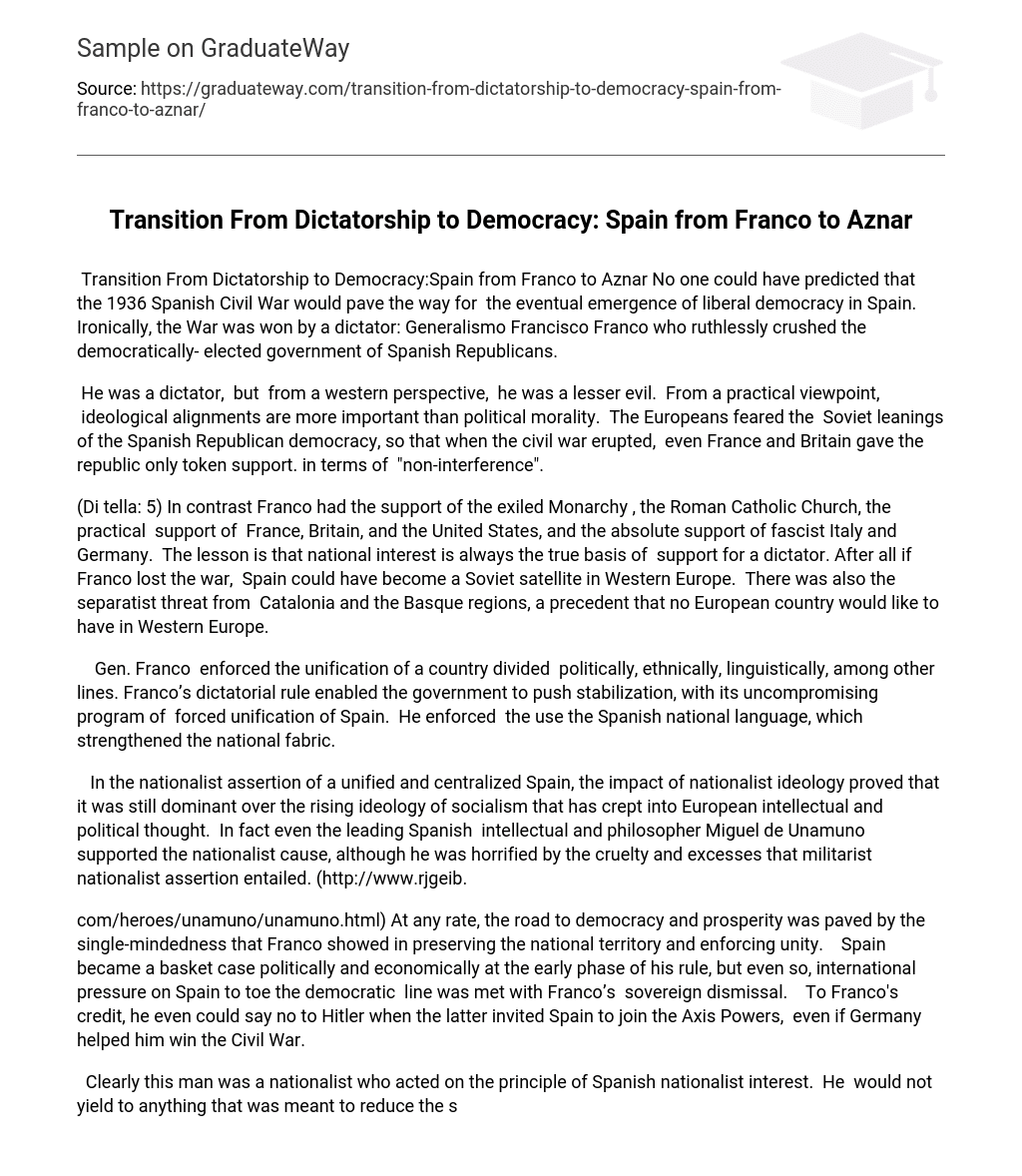Transition From Dictatorship to Democracy:Spain from Franco to Aznar No one could have predicted that the 1936 Spanish Civil War would pave the way for the eventual emergence of liberal democracy in Spain. Ironically, the War was won by a dictator: Generalismo Francisco Franco who ruthlessly crushed the democratically- elected government of Spanish Republicans.
He was a dictator, but from a western perspective, he was a lesser evil. From a practical viewpoint, ideological alignments are more important than political morality. The Europeans feared the Soviet leanings of the Spanish Republican democracy, so that when the civil war erupted, even France and Britain gave the republic only token support. in terms of “non-interference”.
(Di tella: 5) In contrast Franco had the support of the exiled Monarchy , the Roman Catholic Church, the practical support of France, Britain, and the United States, and the absolute support of fascist Italy and Germany. The lesson is that national interest is always the true basis of support for a dictator. After all if Franco lost the war, Spain could have become a Soviet satellite in Western Europe. There was also the separatist threat from Catalonia and the Basque regions, a precedent that no European country would like to have in Western Europe.
Gen. Franco enforced the unification of a country divided politically, ethnically, linguistically, among other lines. Franco’s dictatorial rule enabled the government to push stabilization, with its uncompromising program of forced unification of Spain. He enforced the use the Spanish national language, which strengthened the national fabric.
In the nationalist assertion of a unified and centralized Spain, the impact of nationalist ideology proved that it was still dominant over the rising ideology of socialism that has crept into European intellectual and political thought. In fact even the leading Spanish intellectual and philosopher Miguel de Unamuno supported the nationalist cause, although he was horrified by the cruelty and excesses that militarist nationalist assertion entailed. (http://www.rjgeib.
com/heroes/unamuno/unamuno.html) At any rate, the road to democracy and prosperity was paved by the single-mindedness that Franco showed in preserving the national territory and enforcing unity. Spain became a basket case politically and economically at the early phase of his rule, but even so, international pressure on Spain to toe the democratic line was met with Franco’s sovereign dismissal. To Franco’s credit, he even could say no to Hitler when the latter invited Spain to join the Axis Powers, even if Germany helped him win the Civil War.
Clearly this man was a nationalist who acted on the principle of Spanish nationalist interest. He would not yield to anything that was meant to reduce the sovereignty of Spain. .;;;;Noteworthy was Franco’s astute recognition of signs when a critical point was reached.
For example, when the economy was in the brink of further deterioration, Franco knew his isolationist Felangists economists had lost their relevance. In 1957 he replaced his economic advisers with neo-liberals who had successful businesses and strong ties with the Church. (Di Tella: 3,4). Spain was also fortunate that Franco had envisioned a successor monarch who was a royalty trained in military science and who also appreciated the need to place Spain at par with the democratic achievements of its European neighbors, and who also knew how to balance military and other anti-democracy forces from preventing this eventual shift.
King Juan Carlos’ careful selection of Adolfo Suarez was clearly well-considered, a product of consultations with politicians and leaders, and grounded on Suarez’s qualifications to pursue the shift to democracy. (Di Telli:5) From Franco to King Juan Carlos, to Aznar and then to Suarez, a unified vision of a nationalist and democratic and economically progressive Spain had been carefully laid down and pursued by its leaders. . Spain indeed was blessed with leaders who had the iron will to pursue a national path that they would defend with blood, and pursue to its conclusion : the recovery of Spanish honor and prestige, that had long seen its dustier corridors.
Democratic Europe was a vision for Spain, but unlike France and Britain, Spain had the makings of a Yugoslavia prior to the civil war. Britain and France were essentially monolingual, but Spain was a conglomerate of nationalities. Europe was both a vision and a challenge and a reminder of Spain as a basket case. The European example of progress going with democracy was a model that Spain rightfully pursued.
Nationalist leaders also evidently saw that the socialist path adopted by Eastern European countries was not what they had in mind for their own country. As to the incumbent conservative leader Jose Maria Aznar, how can we argue with success? Aznar’s announced priorities included: trimming the bureaucracy, balancing the budget, rooting out corruption, and stopping Basque terrorism, and meeting the European Union’s standards for inclusion in the single European monetary system of the Euro. He achieved all those in two years. These reforms are sustainable, with long term benefits that have no way to lose, unless the Spanish people decide to pursue populist tracks.
;;;;;;;;;;List of References;Aznar, Jose Maria (2008) Prime Minister of Spain – Assumed National Political Role.Retrieved Dec. 13, 2008 from http://biography.jrank.
org/pages/3021/Aznar-Jose-Maria-1953-Prime-Minister-Spain-Assumed-National-Political-Role.htmlDi Tella,Rafael. (2007) ” Spain : Straddling the Atlantic” Harvard Business School(Feb. 26, 2007 issue ) 1-19.
Umanomo, Miguel de. Retrieved: Dec. 13, 2008 From(http://www.rjgeib.com/heroes/unamuno/unamuno.html)





